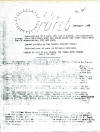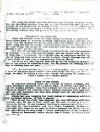

W.J. Sidis Archives Contents Orarch Menu
No. [44?]
THE ORARCH December, 1943
|
Subscription $1 a year, 50¢ for 6 months. For discussion groups, each additional copy per month above the first fully paid year's subscription, 25¢ per year. "GRANT TO OTHERS ALL RIGHTS YOU WOULD HAVE OTHERS GRANT TO YOU." |
______________
THE SHELLING OF BOSTON
On Thursday, November 18, a shell from a British warship in Boston Harbor landed in the Mattapan section of the city.
[First four lines of this paragraph illegible.] No one was injured because there were only dead people in the neighborhood.
However, a slight difference in the cannon's direction (and it was obviously not aimed at all) could have landed the shell where it might have done serious damage. It might easily, for instance, have landed where it could have demolished the city's entire supply of elevated trains.
It was noticed that no military missiles had previously fallen within Boston's limits since 1776, at which time the British were the "enemy."
The Atlantic coast has not, during the present war, been under fire from "enemy" guns; but friendly shells are just as capable of doing damage. Were the alliance with British sentiment not an established policy for the time being, it might be simple to work up sentiment for [rest of paragraph (3 lines) illegible].
______________
NOTICE TO THE READER
At various times since America's entry into the war, we have notified our readers of the possibility that The Orarch may have to suspend issuance at any time. It seems unlikely that we will have to do so immediately; but we feel the reader should be prepared for such an eventuality. In such event, The Orarch will make efforts to provide readers with good substitute reading [rest of sentence illegible].
______________
Laws would be all [illegible] if they did not have to be administered by men.―Boston Globe
______________
For those who think Americans soldiers are fighting to spread freedom and democracy wherever they go, it made interesting news to note the protest of the University of Naples (Italy) at the American Occupation's forbidding a public meeting to listen to speeches on Anti-Fascism. The University claimed they had greater freedom under the Duce.
______________
INTOLERANCE AND OTHERWISE
While the Pacific coast has been busily interning in camps all the inhabitants of Japanese ancestry (including native American citizens), and the California air has been blue with reports of rioting in those camps and all the mutual recriminations that such incidents bring in their train, the report on this question from the home front shows a different side of the question.
New England has been gradually receiving Nissi (native Americans of Japanese descent) from Pacific camps, and the report here is that more of them would be welcomed. Not a single case of prejudice against any one of them has been heard of in New England, though Japanese are still a rare sight in even such a cosmopolitan city as Boston.
War or no war, New England does not go in for prejudice against people on the ground of ancestry alone. And California is learning that the way of slavery does not pay.
______________
"If...we deliberately subject our young people, year after year, to a type of training which insists that some folks are only fit to be lackeys, we shall be taking a long step toward destroying our democracy.―From a letter to a Boston paper.
______________
NORTH OF THE BORDER
In Montreal recently there was a strike of police, firemen, and other municipal employees of a similar order. It lasted only half a day, and was quickly settled. City Hall workers (in the offices of that city's "Hotel de Ville") are striking later. Reports received down here indicate that the city employees most missed were not the policemen but the snow shovelers.
Canada has been bragging how their system of compulsory arbitration has prevented strikes. Is this a sample?
This is not the first time Montreal has been afflicted with such strikes; they had one in 1919, which was followed shortly by a police strike in Boston. It was Governor Coolidge's suppression of that strike that made him Vice-President, and, by a fluke, President; it was his statement that there is no right to strike against the public safety that has been leading to many forms of labor conscription at the present time.
Better an occasional police strike than a sequel of forced labor and slavery.